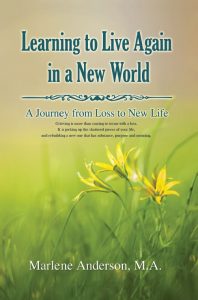Listen to this episode of the Focus With Marlene Podcast
Click here to listen to today’s podcast episode.
Click here to get caught up on all episodes in this series on recovering from loss.
“I destroy my enemies when I make them my friends.”
—Abraham Lincoln
“Holding onto anger is like drinking poison
and expecting the other person to die.”
—supposedly a Buddha quote
Anger, guilt or shame can become lingering emotions felt when losses were troubled by difficult circumstances. We want a quick fix – one we don’t have to work with. Understanding our emotions can help us find a different response.
In my book, Learning to Live Again in a New World, there are two appendixes. In Appendix A, “Complex Grief Emotions,” I offer additional information on how to work through anger, guilt, shame and fear. Here is a quick overview of the first three.
Anger
Anger, like all emotions, has a purpose. It helps us survive and motivates us to take appropriate action and make important changes. Left unchecked, however, anger can become corrosive and problematic. Reacting without restraint will inflict additional pain and suffering on ourselves and others.
While venting or acting out might release some of anger’s energy in the short term, it does not take away the source of your anger. If anger is your typical first response to unpleasant situations, you may have an anger problem.
Here are three things to remember about anger:
- It is okay to be angry.
- It is not okay to hurt yourself, someone else or anyone’s property.
- We are responsible for what we do with our anger.
Anger activates our fight-or-flight response to danger. Losses can trigger a similar response; we want to protect ourselves against the injustice of what happened, and we lash out or attack in some way.
If left unaddressed, anger will build deeply held resentments that become toxic to our emotional and physical health.
Guilt
Guilt is what we experience when we believe we have acted against our beliefs and values resulting in some kind of harm.
Guilt is important because it helps us know when corrections need to be made. Looking backward, we reprimand ourselves, “If only I had done this or that” or “if only I had been more available.” We can become brutal in the self-blame game. At some point, reconciliation and forgiveness is required.
While reflecting is important, it serves no purpose when we maintain an ongoing dialogue built on guilt, shame or remorse.
Remaining in a state of blame only adds another intense layer of pain to our grief that does not accomplish anything.
Working through guilt is working through the multitude of questions associated with the many “why’s, what if’s” and if only’s” and putting them permanently to rest. These unanswerable questions continue to leave us feeling angry, guilty, frustrated and helpless.
Expanding and reframing what happened gives us a different perspective.
- Could I really have done anything different?
- What information do I have today that I didn’t have back then?
Shame
Shame is feeling guilty. It is a painful emotion caused by an awareness of doing something wrong. It diminishes our sense of worth and esteem. Guilt and shame work hand-in-hand with anger.
Guilt helps correct behaviors. Feeling guilty indicates we may have done something wrong that requires making amends. Guilt, along with shame, helps us say we are sorry, and that we regret our actions.
But when faced with an unfortunate or untimely loss, we may be plagued with a guilt and subsequent shame that is misplaced, prolonged or not even appropriate to the situation.
When we feel guilt disproportionate to any actions we may have taken, or may not have taken, our guilt becomes poisonous. Inappropriate shame for perceived transgressions will affect our self-esteem, creating a diminished sense of self because we find no way to correct what was done.
We doubt our ability to be caring individuals.
We might have an unrealistic high sense of responsibility for others.
Guilt and shame that have been blown out of proportion and remain unresolved will erode our ability to live productive and fruitful lives.
Coming to terms with our loss means we come to terms with ourselves as human beings.
If the guilt is appropriate to the event, such as driving drunk and hurting somebody, then we need to use that guilt to turn our lives around. If possible, say you’re sorry. Then take actions to make amends as well as change the direction in your life.
Hanging onto feelings of guilt and shame, nursing them in order to do penance, doesn’t change anything; instead it keeps us from moving forward. Forgiveness enables us to take positive action instead of remaining in a past we cannot change.
If feeling anger, guilt and shame towards yourself, challenge the depth and degree of what you are experiencing. Remind yourself that we make the best decisions we can in any moment in time. Anyone can look backward and see things we didn’t see in the moment.
Next week we will look at forgiveness.
 Learning to Live Again in a New World
Learning to Live Again in a New World
We need validation for the turmoil of thoughts and emotions we experience. But we also need the tools necessary to create a new beginning that is both satisfying and meaningful. My new book, Learning to Live Again in a New World, offers those tools to help work through the problems you might be facing.
It is a guide to help you through the ups and downs of grieving a significant loss. And it includes a study guide at the end for use with groups.
Marlene Anderson


